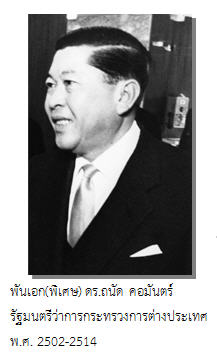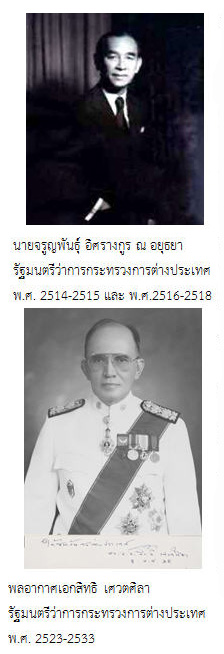About DVIFA
About DVIFA
A History of Devawongse Varopakarn Institute of Foreign Affairs
1. Background: Before 1966
Trainings for Thai foreign service officials in the early days were based on practice,i.e. learning by doing or on-the-job training and apprenticeship that includes the transfer of knowledge, skills, attitude as well as tacit knowledge passed on from one generation to another. Such training was conducted through mentorship system by “seniors” at the workplace.
In 1962, Senior Colonel Thanat Khoman, former Minister of Foreign Affairs, initiated an official training programme for foreign service officials in the form of “in-service training” conducted mainly through workshops on, for instance, drafting of diplomatic correspondence in Thai and English, understanding of manual of style, regulations and Ministerial Decree.

At the beginning, the training programme focused primarily on officials due for postings overseas. Later, it was extended to cover a broader scope of officials including those from other agencies whose departments have overseas offices, such as Ministry of Defence, Ministry of Finance, Ministry of Commerce, and Government Public Relations Department. Main subjects offered in the curriculum include the Ministry of Foreign Affairs’s operation, diplomatic protocol, laws and treaties, economics, and English. In addition, high-level officials, former ambassadors as well as experts from other agencies were also invited to participate in the programme. For instance, in 1966, Mr. Puey Ungphakorn, former Governor of the Bank of Thailand, gave a lecture on economics, Phraya Anuman Rajadhon gave a lecture on religion, and Major General His Royal Highness Prince Wan Waithayakorn, Kromamun Naradhip Bongsprabandh, former Deputy Prime Minister, was invited to share experiences on his tours of duty in the United States.
2. Early Establishment: 1967-1973
In 1967, the Ministry of Foreign Affairs realized the need to train Thai foreign service officials in a “routine and permanent” manner. On 12 December 1967, the cabinet approved the Ministry of Foreign Affairs’ request to establish the “Institute of Foreign Affairs” as part of the Officials and Training Division under the Office of Permanent Secretary. Existing training courses were developed into English language courses and four main training courses for the following groups: newly recruited diplomats, officials to be posted overseas, attaché and third secretary, and second secretary and first secretary.
3. Period of Foundation: 1974 – 2001

The official opening of the Institute of Foreign Affairs was held on 14 February 1974 under former Foreign Minister Charoonpan Isarangkun Na Ayuthaya. On 1 March 1984, under former Foreign Minister Air Chief Marshal Siddhi Savetsila, the Institute of Foreign Affairs was established as a separate entity from the Officials and Training Division. This, in effect, meant that the Institute had its own officials and budget. From 1984 onwards, the Institute has been tasked with personnel development, seminars organisation, and foreign policy publication. Internal structure of the Institute consisted of a training unit, scholarship unit, foreign language centre, and foreign affairs study centre. With regard to management and administration, the Ministry of Foreign Affairs appointed an Ambassador attached to the Ministry to serve as the Dean of the Institute under the supervision of the Permanent Secretary of the Ministry of Foreign Affairs. The first Dean of the Institute was Ambassador Urajchata Rodprasert who served from 1984 to 2000. Additionally, there were also a Policy Council, chaired by Senior Colonel Thanat Khoman, and the Board of Directors, chaired by the Minister of Foreign Affairs, serving as mechanism that facilitate policy formulation and the administration of the Institute respectively.
In 1987, the Ministry of Foreign Affairs separated the foreign affairs study centre from the Institute of Foreign Affairs in order to promote the study and research on foreign policy. Former ambassadors would serve as Director-Generals directly under the Permanent Secretary, in which Ambassador Phan Wannamethee, who served from 1987 to 1991, was the first Director-General of the foreign affairs study centre.
4 Period of Reforms: 2002-2005 (The Second Step for the Institute of Foreign Affairs)
Since the bureaucratic reform in 2002, the Institute of Foreign Affairs was assigned to oversee the training of personnel and the testing of the English language, which was originally overseen by the Department of International Cooperation. In 2004, the Institute’s status was promoted to bureau-level along with modified administrative mechanisms comprising of two supervising heads instead of one, namely the Director (Level 9) and the Ambassador attached to the Ministry (Level 10), who, similar to the Dean, manage the Institute and report directly to the Deputy Secretary of the Ministry. The first Ambassador attached to the Ministry to supervise the work of the Institute of Foreign Affairs was H.E. Ambassador Chitriya Pinthong (2001-2002), and the first Director of the Institute of Foreign Affairs (Level 9) was Mr. Chet Dherapattana.
Furthermore, in 2003 during the years when H.E. Mr. Surakiart Sathirathai served as the Minister, the Saranrom Institute of Foreign Affairs was established to carry out the mission of foreign policy research in place of the Center for Foreign Studies. The Saranrom Institute for Foreign Affairs Foundation was also founded during the same period.
5 Present Day: 2006 to present (From the Institute of Foreign Affairs to the Devawongse Varopakarn Institute of Foreign Affairs)
In 2006, the Institute of Foreign Affairs was granted the royal permission to name the institute after His Royal Highness Prince Devawongse Varopakarn, former Minister of Foreign Affairs, and was given official title and status under the Royal Decree on 7 March 2007 as the "Devawongse Varopakarn Institute of Foreign Affairs" (DVIFA) to continue and expand its mission in cultivating both Thai and foreign diplomatic and foreign affairs personnels. The first person to serve as the Director of DVIFA was Mr. Sarun Charoensuwan.
In addition, to promote integration, the Institute of Foreign Affairs had its duties, staff, and budget transferred from the Ministry of Foreign Affairs to DVIFA in 2014 and resumed its former name of the Center for Foreign Studies.
DEVAWONGSE VAROPAKARN INSTITUTE OF FOREIGN AFFAIRS (DVIFA)
วันทำการ : จันทร์ - ศุกร์ เวลา 08.30 - 16.30 น.
(ยกเว้นวันหยุดนักขัตฤกษ์)